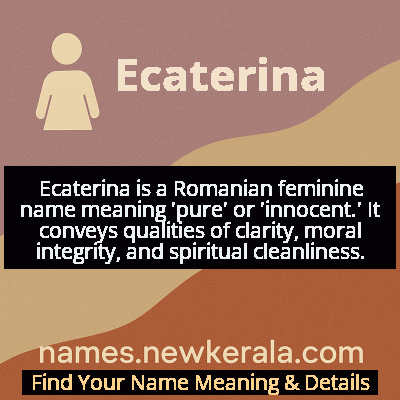Ecaterina Name Meaning & Details
Origin, Popularity, Numerology Analysis & Name Meaning of Ecaterina
Discover the origin, meaning, and cultural significance of the name ECATERINA. Delve into its historical roots and explore the lasting impact it has had on communities and traditions.
Name
Ecaterina
Gender
Female
Origin
Romanian
Lucky Number
4
Meaning of the Name - Ecaterina
Ecaterina is a Romanian feminine name meaning 'pure' or 'innocent.' It conveys qualities of clarity, moral integrity, and spiritual cleanliness.
Ecaterina - Complete Numerology Analysis
Your Numerology Number
Based on Pythagorean Numerology System
Ruling Planet
Uranus (Rahu)
Positive Nature
Strong sense of order, loyal, practical, and disciplined.
Negative Traits
Stubborn, overly serious, rigid, and prone to feeling restricted.
Lucky Colours
Blue, gray.
Lucky Days
Saturday.
Lucky Stones
Blue sapphire.
Harmony Numbers
1, 7, 8.
Best Suited Professions
Managers, engineers, accountants, organizers.
What People Like About You
Dependability, discipline, practicality.
Famous People Named Ecaterina
Ecaterina Teodoroiu
Military Officer
Romanian heroine who fought and died in World War I, known as the 'Heroine of Jiu'
Ecaterina Andronescu
Politician
Romanian politician who served as Minister of Education multiple times
Ecaterina Szabó
Gymnast
Romanian artistic gymnast who won four gold medals at the 1984 Olympics
Ecaterina Oancia
Rower
Romanian rower who won gold medals at the 1984 and 1988 Olympics
Name Variations & International Equivalents
Click on blue names to explore their detailed meanings. Gray names with will be available soon.
Cultural & Historical Significance
Extended Personality Analysis
Women named Ecaterina are typically perceived as possessing a blend of intellectual depth and emotional strength. They often exhibit natural leadership qualities combined with a compassionate nature, making them both respected and beloved in their social circles. Ecaterinas are known for their sharp intellect, curiosity, and love of learning, frequently excelling in academic or professional environments. Their innate sense of justice and moral clarity often leads them to champion causes they believe in, while their diplomatic nature helps them navigate complex social situations with grace. Many Ecaterinas display a quiet confidence that inspires trust in others, and they tend to be loyal friends and dedicated family members who value deep, meaningful relationships over superficial connections. Their combination of intelligence, integrity, and emotional intelligence makes them natural problem-solvers and trusted advisors. The name suggests someone who approaches life with thoughtful consideration and maintains their principles even under pressure, embodying the concept of strength through wisdom rather than force.
Modern Usage & Popularity
In contemporary Romania, Ecaterina remains a classic and respected name, though its usage has evolved. While it was extremely popular in the early to mid-20th century, it has become less common in recent decades as parents opt for more modern or international names. However, it maintains a strong presence among traditional families and in rural areas where naming customs preserve historical and religious connections. The name is experiencing a mild resurgence among educated urban families who appreciate its classical elegance and cultural significance. Current usage trends show it as a name chosen by parents seeking a distinctive yet traditional option that honors Romanian heritage while projecting sophistication and strength. While not among the top 50 most popular names currently, Ecaterina continues to be recognized as a name of substance and character, often preferred by parents who value historical continuity and cultural depth in their naming choices.
Symbolic & Spiritual Meanings
Symbolically, Ecaterina represents purity of spirit, intellectual enlightenment, and unwavering moral conviction. The name evokes images of clarity and truth-seeking, much like its association with the Greek word 'katharos' meaning pure. It symbolizes the triumph of intelligence and faith over adversity, drawing from Saint Catherine's legendary debates with pagan philosophers. In metaphorical terms, Ecaterina embodies the concept of inner strength manifesting through grace and wisdom rather than brute force. The name also carries connotations of royal dignity and spiritual nobility, suggesting someone who maintains their integrity regardless of circumstances. It represents the ideal balance between feminine gentleness and intellectual power, making it a symbol of complete, well-rounded womanhood. The name's connection to the wheel (from Saint Catherine's martyrdom instrument) further symbolizes the cyclical nature of life, fate, and the turning of fortunes, adding layers of philosophical depth to its symbolic meaning.

